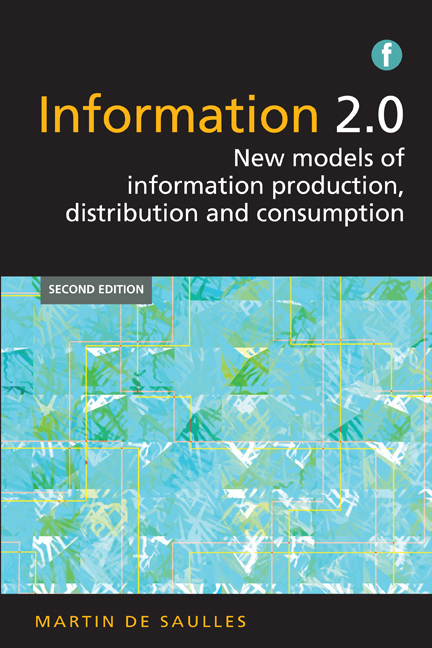5 - New models of information consumption
Published online by Cambridge University Press: 08 June 2018
Summary
Introduction
Having looked at new ways that information is produced, distributed and stored, this chapter will consider new ways that we are consuming information. Ultimately, the way we consume information has not changed over the years as it still relies on the sensory functions of our eyes and ears to pass sights and sounds to our brains for decoding, processing and making sense of. However, the methods and devices by which information now reaches us have changed dramatically. An evolving ecosystem of hardware and software is constantly struggling for our attention as we work, play, relax and travel. Where time and location were once constraints on the types of information we could access, these barriers are being broken down as devices become portable and networks become pervasive. Giddens (1990) explained the significance of this dislocation with his concept of time and space distanciation whereby remote connections and interactions come to dominate modern life. The first telegraph and telephone systems built in the 19th century began this revolution, and more recent developments in computing and mobile devices and networks have accelerated it.
This chapter explores a range of issues surrounding these developments and considers their implications for information professionals and the work they do. The plethora of new information consumption devices is examined within the context of the networks and information ecosystems that support them. A central theme is the tension between organizations that are attempting to exert control over these systems and those organizations and users planning to develop a more open environment. This tension extends the battles we have seen over personal computer operating systems and now extends to mobile devices and the applications that run on them. We will look at the discussions surrounding information overload and how, as some would argue, we are becoming unable to process all the information that is pushed at us from fellow workers, friends and social media contacts. Related to these discussions is the issue of information literacy and a concern that, while most of us can use the internet to find information, many people struggle to make sense of what they find. The opportunities for information professionals in helping users to develop their information literacy skills will be considered, as the role for many IPs is changing from information gatekeeper to facilitator.
- Type
- Chapter
- Information
- Information 2.0New models of information production, distribution and consumption, pp. 103 - 130Publisher: FacetPrint publication year: 2015



